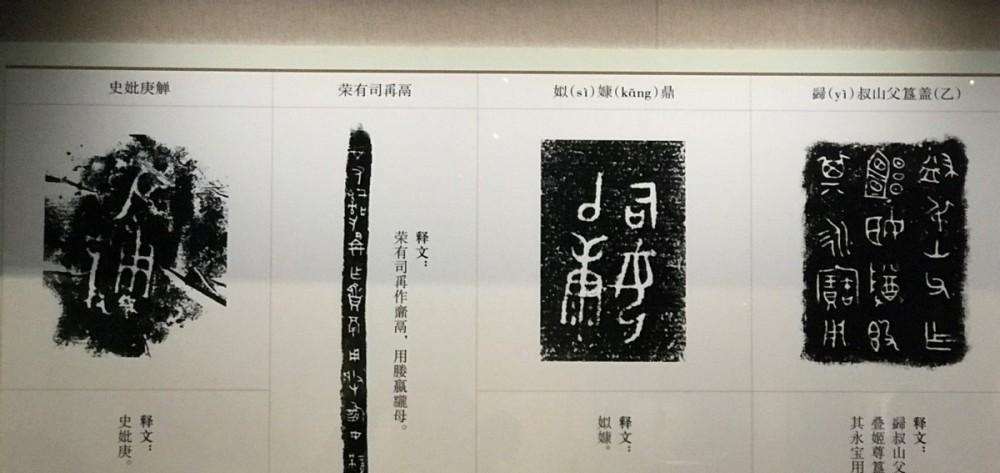Shang Zhou was already a patrilineal society, and women lost the lofty status of the matrilineal clan and gradually receded to a subordinate position, hidden behind male power. Nevertheless, women still play an important role in marriage, society, and life. The wife of King Wuding of the Shang Dynasty was good, she could lead soldiers to fight and preside over sacrifices, and King Wu of Zhou's wife Yi Jiang assisted the kings of the two dynasties in achieving the rule of Chengkang.
Marriage is also an effective means for large families to strengthen ties during the Shang and Zhou Dynasties, and married women become the link between the mother's family and the husband's family, making contributions to the strength and development of the family that are difficult to achieve in other ways.
The inscriptions on the Shang Zhou bronzes unearthed in Baoji show the names of many female nobles, who either accepted sacrifices from future generations, or married to their husbands' families with dowries, or received rewards or gifts.
Although women in the Shang Zhou Dynasty cannot "top half of the sky", they have traveled through two thousand years of time and shone brightly in the depths of history.

The National Expo "Zhaozi China - Baoji Unearthed Bronze Ware and Golden Essence" exhibition shows the interpretation of bronze gold texts.
Late Shang Dynasty
姒 is a surname, and 嫝 is the private name of the sacrificed person.
Early Western Zhou Dynasty Shi Fei Gengxuan.
The so-called concubine, merchants mostly refer to grandmothers or female ancestors above grandmothers; Zhou people use to indicate deceased mothers. This piece is a ceremonial vessel used by the nobles of the Shi clan to sacrifice their grandmother, Yu Geng.
In the late Western Zhou Dynasty, Rong had a mane.
The inner wall is cast with 12 characters, which means: Rong Yousi cast this bronze mane, which was for the dowry of the mother of the concubine.
Concubines, dowry vessels. On the one hand, the purpose of the production is to consolidate the political alliance with the marriage relationship, and on the other hand, it also includes the blessings and expectations of the elders for the marriage of the daughter. The proportion of water vessels in the vessel is very high, which may be related to the need for wedding ceremonies and the washing and grooming of the ceremony.
Late Western Zhou Dynasty Yi (traditional) Shushan Father Gui Gai (B).
This instrument is a dowry instrument made by Shushan's father for his daughter, expressing his blessings and ardent expectations for his daughter's life.
Partial bronze interpretations.
Late Western Zhou Dynasty Uncle Father Pot Lid.
This is a ceremonial vessel made by his uncle for his wife. The conjuring of the order of the family and the surname is one of the most common ways of referring women in the Zhou Dynasty, and Shu Ji is an example. Ji should be the father's surname of Shu Ji, and this way of calling reflects to a certain extent the dependence of women on male power under the patriarchal social form.
Uncle Father's artifacts have been excavated in ZhouYuan, indicating that Uncle Gong was a prince who lived in Zhou Yuan in the late Western Zhou Dynasty, and the status of the family should not be underestimated, and the growth of his family was inseparable from the marriage with the nobles surnamed Ji.
Late Western Zhou Dynasty Haomu Cup Cover.
Late Western Zhou Dynasty Shanfu Brigade Boding.
This late Western Zhou Dynasty Shanfu Brigade Boding is a ceremonial vessel made by Shanfu Lubo for his wife Mao Zhongji.
The ancestor of Mao Zhongji in the inscription should be a heavy courtier in the early Western Zhou Dynasty. The marriage of Shanfu Lubo and the Mao clan should also have had a positive impact on the rapid rise of his family
Late Western Zhou Dynasty Cheng's grandson was a mane.
This is the ritual vessel made by Uncle Cheng's grandson for the baptism, which is the name of the country and the surname of the family. She may be the wife of Uncle Cheng's grandson.
Recommended related reading:
Guobo: "Zhaozi China" exhibition on a bright bronze ware
Shoubo: The cultural relics unearthed from the Mausoleum of The First Emperor of Qin are more stunning than the same
Why is the taste of the year getting weaker and weaker